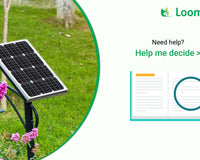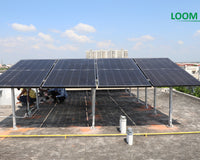An off-grid is a renewable energy solar system that operates independently from the electrical grid. It is designed to generate and store electricity using solar panels, batteries, and other components. These systems provide a self-sustaining power supply, allowing individuals, households, or communities to generate their own electricity and meet their energy needs independently. Off-grid solar systems are often used for powering homes. Along with that there are several challenges that need to be addressed for reliable and sustainable power supply. High upfront costs pose a significant barrier, making it challenging for individuals to invest in the initial setup and many more challenges. Overcoming these challenges is crucial to promote the adoption of off-grid solar systems and enhance energy access for communities.
Challenges of an off-grid solar system:
Initial Cost: The upfront cost of installing an off-grid solar system can be high. It includes the cost of solar panels, batteries, charge controllers, inverters, and other necessary equipment.
More space: Off grid solar system take too much space because it has many components in it especially if you have limited area. That's why on grid solar system are on rise that have make solar system design to be sleeker.
System Maintenance: Off-grid solar systems require regular maintenance to ensure optimal performance. This includes cleaning solar panels, inspecting and maintaining solar battery health, checking connections, and monitoring the overall system performance.
Load Management: Managing the energy demand and load balancing is essential in off-grid systems to avoid overloading the system and draining the battery bank. Users need to be mindful of their energy usage, especially during peak periods, and make necessary adjustments to avoid system failures or energy shortages.
Power Back up: Off-grid solar systems rely on batteries to store excess energy generated during the day for use at night or during cloudy periods.
Short lifespan of battery: Battery need to be replaced at least 4 to 6 times in the whole life of solar systems. You need to buy new batteries time to time.
Weather Dependency: Off-grid solar systems rely on sunlight to generate electricity. Therefore, they are highly weather-dependent. Cloudy weather, shading, and other environmental factors can significantly impact the system's energy production. Lack of sunlight for an extended period can lead to energy shortages.
Limited Energy Storage: The storage capacity of batteries in off-grid solar systems is typically limited, which can be a challenge during the period of low sunlight or in the winters. Insufficient energy storage may result in power shortages and the need for alternative backup power sources.
Conclusion
The challenges of off-grid solar systems include high upfront costs, limited energy storage capacity, dependency on weather conditions, system maintenance requirements, and the need for proper system sizing and design. Overcoming these challenges is crucial to ensure reliable and sustainable off-grid power supply.












